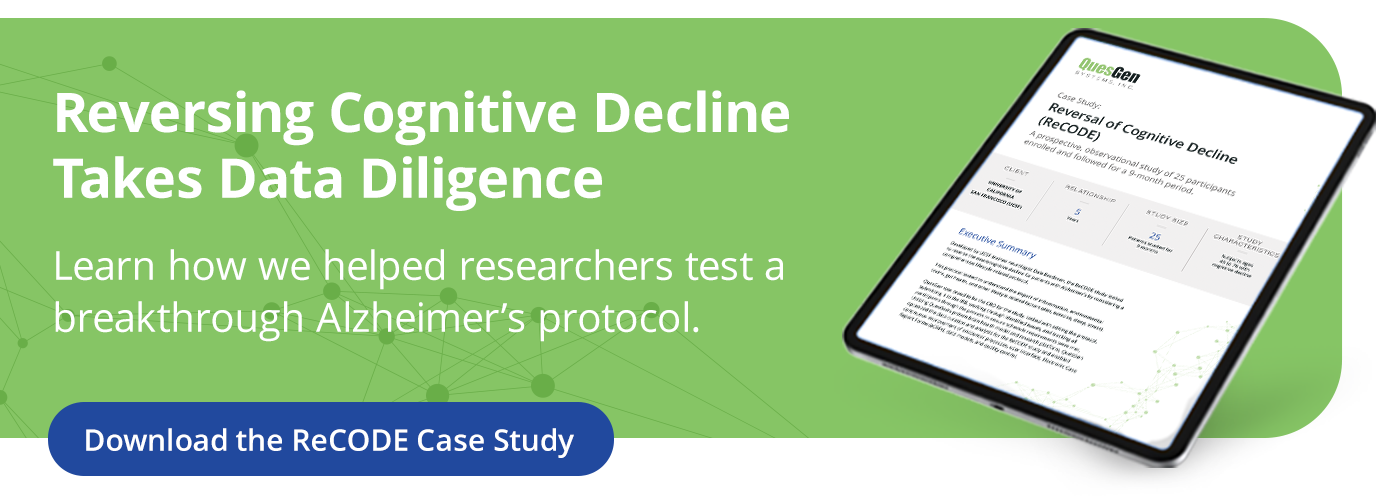5 Promising Trends in Alzheimer’s Research for 2022 (and beyond)
by Mike Jarrett | Oct 27, 2021 | Cognitive Decline, Alzheimer's Disease | comments

Alzheimer’s impacts millions of people every year. And while the number of people living with Alzheimer’s could more than double by 2060, there are promising trends in the research community.
These trends signal progress and a vision to prevent, slow, or even cure Alzheimer’s disease someday. From clinical alliances to breakthrough drugs, here are some of the most promising trends to embrace as we head into 2022.
Trend #1: Faster Treatment Development Through Collaborations
Developing any new medication is a long process filled with barriers and complexities. Acknowledging the special urgency around Alzheimer’s, the research community has begun forming partnerships to speed up discoveries.
One of those partnerships is between the Clinical Data Interchange Standards Consortium (CDISC) and the Coalition Against Major Diseases (CAMD) – an alliance of pharmaceutical companies, nonprofit foundations, and government advisers.
Together, the CAMD and CDISC have created and shared data standards for Alzheimer’s clinical trials spanning more than 6,500 study participants so far.
Researchers expect transparent collaborations like this to accelerate the development of new, more effective therapies.
Trend #2: Better Use of Biomarkers
The use of biomarkers is rapidly evolving and impacting both disease identification and treatment.
For example, medical researchers state we can now make better predictions that a patient has the brain pathology to respond to treatment by conducting a brain scan to check for the presence of amyloid. Those same researchers also mention other biomarkers in development aimed at exploring less expensive ways of identifying Alzheimer’s disease.
Trends like these are promising for the Alzheimer’s research community and the greater population because they are geared toward increasing access.
Trend #3: Earlier Targeting & Earlier Study Enrollments
Earlier intervention is often a sign of progress in medical research. In Alzheimer’s disease research, that sign of progress is starting to emerge.
For example, Eisai Pharmaceuticals developed an antibody specifically targeting an early form of beta amyloid (plaques), a toxic protein known for depositing in the brain of patients with Alzheimer’s. The premise of work like this is that treatments should be more successful early in the course of the disease – before significant formation of these toxic proteins.
In a similar way, there’s an increased focus on enrolling clinical trial participants earlier. This trend has been sparked by the understanding that changes in the brain occur years before the onset of symptoms.
Changes in the brain occur years before the onset of symptoms. We must start studying the disease sooner.
The intent is for earlier study enrollments and earlier interventions to change the course of Alzheimer’s disease.
Trend #4: New Targeting Approaches for Plaques & Tangles
Plaques are a primary sign of Alzheimer’s disease as they form between nerve cells of the brain. Many of the new Alzheimer’s treatments are hyper-focused on plaques.The increased focus on targeting plaques includes three main approaches:
- recruiting the immune system
- preventing destruction
- production blockers.
Within these three approaches, several experimental drugs have been developed with varying degrees of success in clinical trials.
There’s also a special focus on tangles. Tau tangles are generally mentioned alongside plaques as a characteristic sign of Alzheimer’s, and researchers are looking for ways to prevent these tangles from occurring. Several clinical trials have taken place and are being developed, including tau aggregation inhibitors and tau vaccines.
Trend #5: Looking at the Head & Heart Connection
For many years, researchers have noted a link between brain health and heart health. Conditions such as high blood pressure, stroke, diabetes, and high cholesterol appear to increase a person’s risk of developing Alzheimer’s disease. There are several new studies exploring this connection and how to use it for prevention and treatment.
One interesting strategy being looked at by researchers is whether drugs such as blood pressure medication could help reduce the risk of dementia.
On the discovery level, researchers are also investigating the molecular relationship between heart health and brain health to potentially find new drug targets. And of course, lifestyle is a major consideration when researching disease. With this heart-head connection trend has come a renewed focus on lifestyle choices and their impact on heart conditions and Alzheimer’s disease.
Working Together & Making Progress
Alzheimer’s research is challenging and the bold investigators in this field continue to face roadblocks. In fact, it’s possible some of the trends mentioned in this post will someday be proven ineffective, or they may pivot.
That’s the reality of experimental studies and drug discovery. But progress is clearly being made in Alzheimer’s research.
Research communities are rallying around Alzheimer’s and cognitive decline, and QuesGen is proud to serve some of these impactful studies as their CRO (Clinical Research Organization).
For example, the ReCODE study (Reversal of Cognitive Decline) looked to reverse the neurocognitive decline for patients with Alzheimer’s by considering a comprehensive lifestyle-related protocol. QuesGen was the CRO for ReCODE – tasked with editing the protocol, submitting it to the IRB, working through identified issues, and tracking participants through the process to ensure schedule requirements were met.
For a deeper look at this particular use case, read the ReCODE case study.
Article References:
1. Alzheimer's treatments: What's on the horizon?
2. 2021 Alzheimer's disease facts and figures
3. Recent Trends in Alzheimer’s Research
4. The Coalition Against Major Diseases: developing tools for an integrated drug development process for Alzheimer's and Parkinson's diseases
5. Clinical Data Interchange Standards Consortium
6. Getting to the Heart of Alzheimer Disease
7. Sharp Mesa Vista Alzheimer’s Clinical Trials

